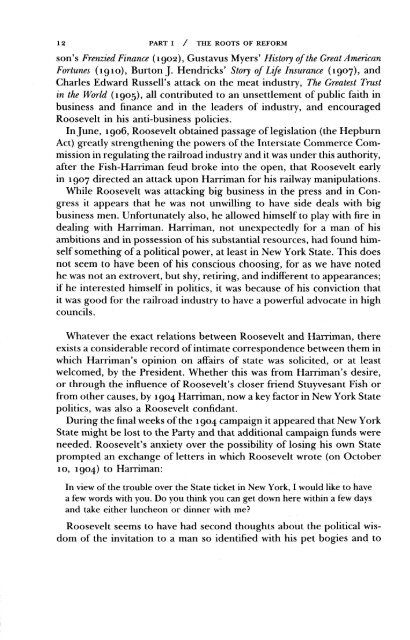You also want an ePaper? Increase the reach of your titles
YUMPU automatically turns print PDFs into web optimized ePapers that Google loves.
12 PART I / THE ROOTS OF REFORM<br />
son's Frenzied Finance (1902), Gustavus Myers' History ofthe Great American<br />
Fortunes (1910), Burton J. Hendricks' Story of Life Insurance (1907), and<br />
Charles Edward Russell's attack on the meat industry, The Greatest Trust<br />
in the World (19°5), all contributed to an unsettlement of public faith in<br />
business and finance and in the leaders of industry, and encouraged<br />
Roosevelt in his anti-business policies.<br />
InJune, 1906, Roosevelt obtained passage oflegislation (the Hepburn<br />
Act) greatly strengthening the powers of the Interstate Commerce Commission<br />
in regulating the railroad industry and it was under this authority,<br />
after the Fish-Harriman feud broke into the open, that Roosevelt early<br />
in 1907 directed an attack upon Harriman for his railway manipulations.<br />
While Roosevelt was. attacking big business in the press and in Congress<br />
it appears that he was not unwilling to have side deals with big<br />
business men. Unfortunately also, he allowed himself to play with fire in<br />
dealing with Harriman. Harriman, not unexpectedly for a man of his<br />
ambitions and in possession ofhis substantial resources, had found himselfsomething<br />
ofa political power, at least in New York State. This does<br />
not seem to have been of his conscious choosing, for as we have.noted<br />
he was not an extrovert, but shy, retiring, and indifferent to appearances;<br />
if he interested himself in politics, it was because of his conviction that<br />
it was good for the railroad industry to have a powerful advocate in high<br />
councils.<br />
Whatever the exact relations between Roosevelt and Harriman, there<br />
exists a considerable record ofintimate correspondence betweenthem in<br />
which Harriman's opinion on affairs of state was solicited, or at least<br />
welcomed, by the President. Whether this was from Harriman's desire,<br />
or through the influence of Roosevelt's closer friend Stuyvesant Fish or<br />
from other causes, by 1904 Harriman, now a key factor in New York State<br />
politics, was also a Roosevelt confidant.<br />
During the final weeks ofthe 1904 campaign it appeared that New York<br />
State might be lost to the Party and that additional campaign funds were<br />
needed. Roosevelt's anxiety over the possibility of losing his own State<br />
prompted an exchange of letters in which Roosevelt wrote (on October<br />
10, 1904) to Harriman:<br />
In view of the trouble over the State ticket in New York, I would like to have<br />
a few words with you. Do you think you can get down here within a few days<br />
and take either luncheon or dinner with me?<br />
Roosevelt seems to have had second thoughts about the political wisdom.<br />
of the invitation to a man so identified with his pet bogies and to

















